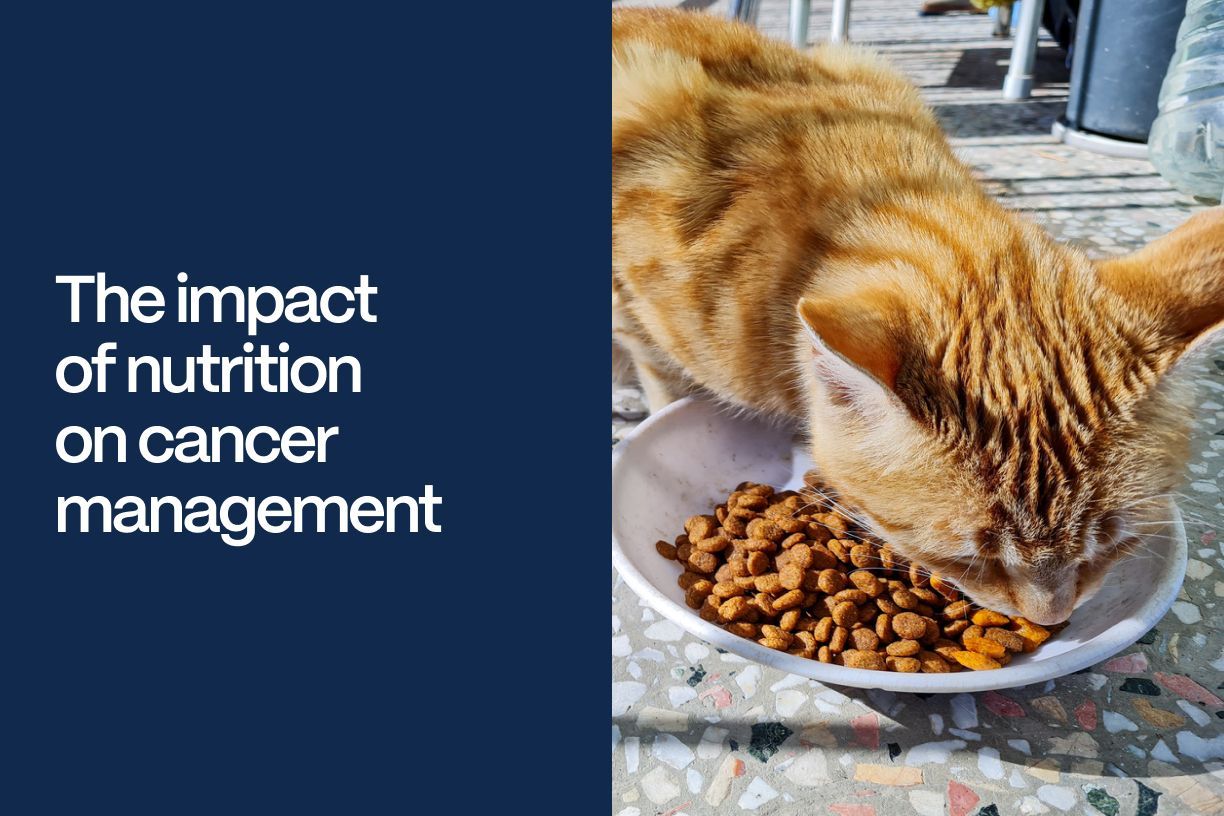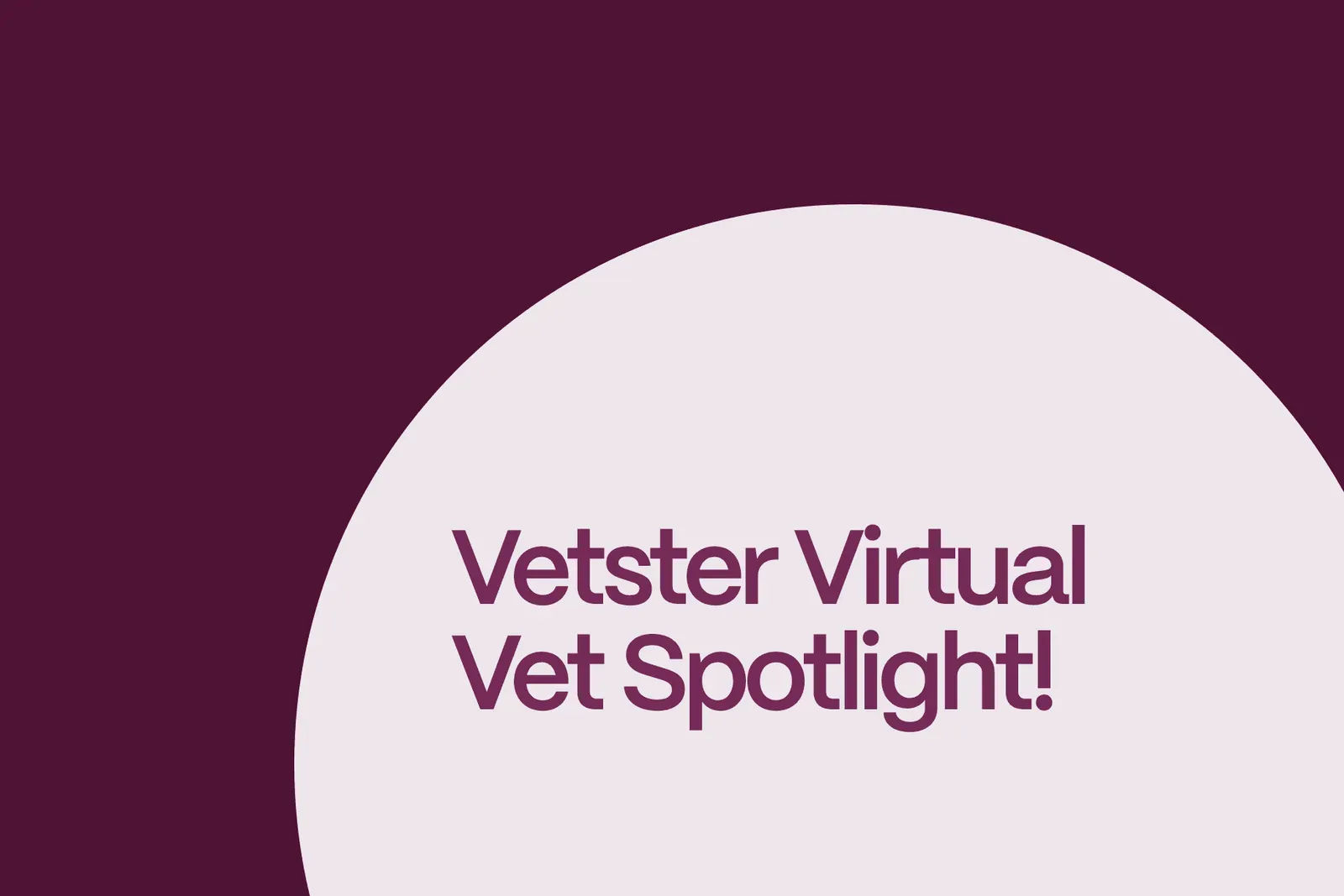The impact of nutrition on cancer management

Cancer treatment is challenging, but research underscores the vital role that nutrition can play. As a virtual care veterinarian on Vetster, you are uniquely positioned to educate and empower pet owners on how tailored nutritional strategies can support their dogs and cats through their cancer journey. By offering ongoing nutrition consultations, you can supplement the treatment plan, and become a valuable member of the client's veterinary care team. This post explores evidence-based information on the importance of nutrition in cancer management for pets and provides practical tips for virtual care consultations.
The role of dietary therapy for pets with cancer
Supporting the Immune System: Proper nutrition is essential for maintaining a robust immune system, which is critical for pets battling cancer. Diets rich in antioxidants, such as vitamins E and C, can help neutralize free radicals and support immune function.
Managing Cachexia: The weight loss and muscle wasting characteristic of cancer cachexia, are common in pets with cancer. High-protein diets and specific amino acids, like arginine and glutamine, can help preserve muscle mass and improve overall condition.
Reducing Inflammation: Omega-3 fatty acids from fish oil have anti-inflammatory properties that may benefit pets with cancer. These fatty acids can help reduce tumor-associated inflammation and support overall health.
Enhancing Quality of Life: Nutritional interventions can alleviate symptoms such as nausea, vomiting, and poor appetite. Palatable, high-calorie diets can encourage food intake, maintaining energy levels and improving quality of life.
Evidence-based nutrition strategies
Low-Carbohydrate, High-Fat Diets: Some studies indicate that many cancers thrive on glucose. Therefore, reducing carbohydrate intake and increasing fats can potentially slow cancer progression. Diets such as ketogenic diets, which are low in carbohydrates and high in fats, are being explored for their potential benefits in managing cancer.
High-Quality Protein Sources: Canine and feline cancer patients often need higher levels of protein to combat muscle wasting. Diets should include high-quality, easily digestible proteins to support lean body mass.
Specialized Therapeutic Diets: Several commercial therapeutic diets are designed specifically for pets with cancer. These diets are formulated to provide balanced nutrition while addressing the unique needs of cancer patients. Vetster’s in-appointment tools make it easy for you to explore options with your clients, and VetsterRx streamlines the process of connecting clients with the products you recommend.
Support the Whole Patient with Supplements
Supplements containing EPA and DHA may help reduce inflammation and support the immune system while antioxidants such as Vitamins E and C may help protect cells from damage. Pets undergoing cancer treatment often have compromised gut health which may benefit from the use of probiotics. Use VetsterRx, to record your recommendations for supplements and other nutrition solutions directly within the platform. Using the integrated search features, it's easy to find and select the items you want to suggest. This seamless process connects clients with the products you recommend, enabling convenient online ordering and home delivery directly within the app.
Virtual Care Consultations: Empowering Pet Owners
Virtual care platforms provide an invaluable opportunity to guide pet owners on the best nutritional practices for their pets with cancer. Here’s how veterinarians can leverage these consultations:
Comprehensive Dietary History: Gather detailed information about the pet’s current diet, eating habits, and any supplements they are taking. Understanding their nutritional baseline is crucial for tailoring recommendations.
Personalized Nutrition Plans: Create a personalized nutrition plan based on the pet’s specific type of cancer, stage of disease, and overall health status. Integrating high-quality therapeutic diets and supplements into your clients' plans can provide significant benefits for their pets.
Ongoing Support and Monitoring: In-app features such as Vetster’s "Request follow-up" and direct messaging tools facilitate monitoring the pet’s progress and adjusting the nutrition plan as needed. Regular check-ins can ensure that dietary adjustments are effective and address any new symptoms or changes in condition.
Educating Pet Owners
Virtual care consultations are an excellent platform for educating pet owners about the critical role nutrition plays in their pet’s cancer management. These consultations offer a convenient and accessible way to discuss dietary strategies and address any questions or concerns pet owners might have. Provide a great client experience by using Vetster’s convenient in-app tools to share educational resources, such as articles, videos, and detailed dietary guides. Ensure that clients fully understand your recommendations by reviewing dietary plans and nutritional information in real time, and schedule a follow-up to reinforce the information shared during the consultation. For additional guidance on how to communicate effectively and build strong client relationships during these conversations, explore our blog post on strategies for earning trust during nutrition consultations.
The intersection of nutrition and cancer management in pets is a vital area of veterinary care that holds significant potential to improve outcomes. Virtual care veterinarians have a unique opportunity to provide tailored nutritional advice, support ongoing dietary management, and ultimately enhance the quality of life for pets with cancer. By leveraging the tools and resources available through virtual care platforms, veterinarians can ensure that pet owners are well-informed and equipped to support their pets through their cancer journey.
Sources
-
Tufts Veterinary Nutrition: Feeding Pets With Cancer
-
Today's Veterinary Practice: Nutrition for Small Animal Cancer Patientis
-
The Pet Oncologist: Nutrition in Pets with Cancer
-
Veterinary Practice News: Nutrition’s Role in Cancer Patients
-
Veterinary Cancer & Surgery Specialists: Nutrition in Cancer Patients
Looking to join Vetster?
You may create an account as a veterinary professional, or learn more here.









